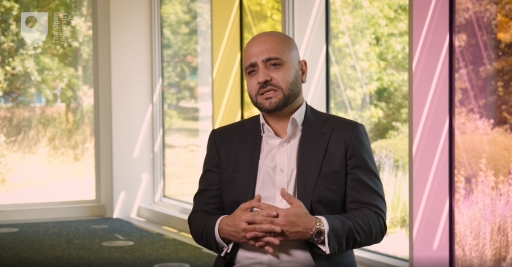4 Career progression
So far this week, you’ve focused on the beginning of someone’s career within your organisation, but career progression also plays an important part in maintaining their commitment and focus.
In this short film, Asif Sadiq explains the role of equity throughout the recruitment process and beyond – creating a level playing field for people from all backgrounds to succeed.

Transcript: Video 7: Equity
Ensuring that all opportunities for progression and development are made transparent and inclusive, is another important step.
Transparent career paths
Coffman et al (no date) describe three steps an organisation can take to establish a culture of transparency in this context:
- create strong career paths, determining the required skills and competencies to reach various roles or career stages
- identify available training and professional development resources for employees to gain those skills
- clearly and consistently communicate that information to employees so they can make informed decisions and pursue growth opportunities at the company.
Once everyone knows, or can easily find out, what their options are, careful monitoring of the diversity characteristics of those who apply for and obtain the various opportunities should be undertaken.
If the results of that monitoring demonstrate an issue with inclusion, there are a number of initiatives an employer might consider.
Career mentoring and sponsorship
Mentoring is a more familiar concept for most of us, described by Omadeke (2021) as
‘a relationship between someone sharing knowledge and providing guidance (the mentor) and someone learning from that person’s experience and example (the mentee).’
Sponsorship can be thought of as a more active process, in which the sponsor advocates for the sponsee in situations where they are not in the room, e.g. with senior leaders or decision makers.
In this short video, Ritu Basin considers who is driving the outcomes in mentoring and sponsorship relationships.
In many cases, sponsorship is an organic process that grows through effective relationship building. However, if you’re interested in a more structured approach, Bain and Company have some advice about developing a sponsorship and mentoring programme.
Development programmes
In their article on diversity, equity and inclusion ‘game changers’, Work 180 (2021) share several examples of employer initiatives that are making opportunities more accessible for under-represented groups. These include programmes focusing on:
- Women in leadership
- Autism at work
- Youth employment
- Flexibility and work life balance
- Targeted groups, e.g. migrants and refugees, or ex-military.
In several cases, an external organisation has been brought in to provide the structure for specialised training, coaching, networking etc.
BBC Elevate programme (Garde & Trustwell, 2025)
A talent-led initiative from BBC Content and Creative Diversity to ‘progress mid-level deaf, disabled and/or neurodivergent production talent industry-wide who have experienced blockers in developing their career due to access barriers.’
Participants are matched with roles in production companies working across BBC content. They are employed directly by host companies on fixed term contracts substantially funded by the BBC, which also oversees any access requirements. Placements include tailored training, coaching and mentoring for participants along with support for the host production company.
Over 80% of Elevate candidates have stayed at their role and have continued to progress their career in the industry.
